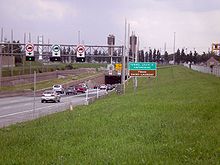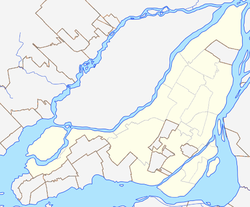You can help expand this article with text translated from the corresponding article in French. (December 2017) Click for important translation instructions.
|
 Montreal entrance to tunnel, 2009 Montreal entrance to tunnel, 2009 | |
| Overview | |
|---|---|
| Location | Montreal, Quebec, Canada |
| Route | |
| Crosses | St. Lawrence River |
| Operation | |
| Opened | March 11, 1967; 57 years ago (1967-03-11) |
| Traffic | 120,000 |
| Character | Limited access highway |
| Technical | |
| Length | 1,391 m (4,563.6 ft) (tunnel section) 409 m (1,341.9 ft) (causeway section) |
| No. of lanes | 6 |
| Tunnel clearance | 4.4 m (14 ft 5+1⁄4 in) |
| Width | 37 m (121.4 ft) |
 | |
The Louis-Hippolyte Lafontaine Bridge–Tunnel (French: Pont-Tunnel Louis-Hippolyte-La Fontaine) is a highway bridge–tunnel running over and beneath the Saint Lawrence River. It connects the Montreal borough of Mercier–Hochelaga-Maisonneuve with the south shore of the river at Longueuil, Quebec.
Named after Lower Canada political reformer Louis-Hippolyte Lafontaine, the Lafontaine Tunnel is an immersed tube structure, measuring 1,391 m (4,563.6 ft) long. It carries the Autoroute 25 expressway and passes beneath the main shipping channel in the Saint Lawrence River, immediately downstream from the Saint Lawrence Seaway. It surfaces on Île Charron (Îles de Boucherville at Exit 1 of Autoroute 25), then continues by bridge to Longueuil. The bridge-tunnel sees about 120,000 daily crossings, of which 13% are trucks. Construction began in 1963, and opening day was March 11, 1967.
History
In 1960, the construction of the Trans-Canada Highway (TCH) through Quebec from the Ontario border to Rivière-du-Loup was announced. In Montreal, to avoid having to build a huge bridge that would have disfigured the city and destroyed a neighbourhood, engineers opted for the construction of a tunnel located under the Saint Lawrence River and dug a trench under the river bed and buried the tunnel sections 4.6 metres (15 ft) to 6.1 metres (20 ft) under the river bed.
The church in Longue-Pointe had to be demolished to make way for the tunnel, and 300 families were expropriated from the village in 1964. The construction was completed in March 1967, just before the opening of Expo 67. Construction cost $75 million.
A major four-year refurbishment of the tunnel began in 2020 was originally planned to be completed in 2024 at a cost of $1.2 billion, but in 2022, it was announced that the project would take a year longer than expected and that at its completion in 2025, it will have a total cost of $2.1 billion.
Specifications

Each of the seven tunnel sections weighs 32,000 t (31,000 long tons; 35,000 short tons) and is 110 metres (360 ft) long, 37 metres (121 ft) wide, and is 8 metres (26 ft) high. In total, the bridge–tunnel is 1.8 kilometres (1.1 mi) long.
The tunnel was built with sections prefabricated in dry dock and then sunk in the river 24 metres (79 ft) below the surface of the water.
It is one of the largest prestressed concrete structures in the world and is the longest bridge-tunnel in Canada.
See also
References
- ^ "Rebuilding Louis-Hippolyte-La Fontaine Tunnel a four-year ordeal". Montreal Gazette. June 21, 2018. Retrieved November 3, 2018.
- ^ "Louis-Hippolyte-Lafontaine, the longest bridge-tunnel in Canada, turns 50". Montreal Gazette. March 11, 2017. Retrieved December 20, 2017.
- ^ "Il y a 50 ans, le pont-tunnel était inauguré". Métro (in Canadian French). March 9, 2017. Retrieved December 20, 2017.
- "Un village sacrifié pour le pont-tunnel". Métro (in Canadian French). March 9, 2017. Retrieved December 20, 2017.
- "At 50, the Louis-Hippolyte-La Fontaine bridge-tunnel still a world-class wonder". CBC News. Retrieved December 20, 2017.
- "Additional year of construction -- and traffic disruptions -- for Lafontaine tunnel revamp". CTV News. August 4, 2022. Retrieved August 7, 2022.
- Ministère des Transports (March 28, 2014). "Construction du Pont-tunnel Louis-Hippolyte-La Fontaine". YouTube (in French). Archived from the original on December 21, 2021. Retrieved December 21, 2017.
External links
- Louis-Hippolyte Bridge–Tunnel (A-25) at Steve Anderson's montrealroads.com
- Louis-Hippolyte Lafontaine Tunnel at Structurae
| Bridges of the St. Lawrence River | ||||
|---|---|---|---|---|
| ||||
| Urban agglomeration of Longueuil | |
|---|---|
| Cities | |
| Boroughs of Longueuil | |
| Pre-2002 towns and cities (now merged) | |
| Politics |
|
| Transportation |
|
| Public services | |
| Education | |
| Media | |
| Other | |
| Bridge–tunnels | |
|---|---|
| Asia | |
| Europe | |
| North America | |
45°34′46″N 73°28′46″W / 45.57944°N 73.47944°W / 45.57944; -73.47944
Categories:- Bridges in Montreal
- Bridge–tunnels in North America
- Transport in Longueuil
- Bridges over the Saint Lawrence River
- Bridges completed in 1967
- Tunnels completed in 1967
- Bridges on the Trans-Canada Highway
- Tunnels on the Trans-Canada Highway
- Buildings and structures in Longueuil
- Mercier–Hochelaga-Maisonneuve
- Road bridges in Quebec
- Road tunnels in Quebec
- Immersed tube tunnels in Canada
- 1967 establishments in Quebec